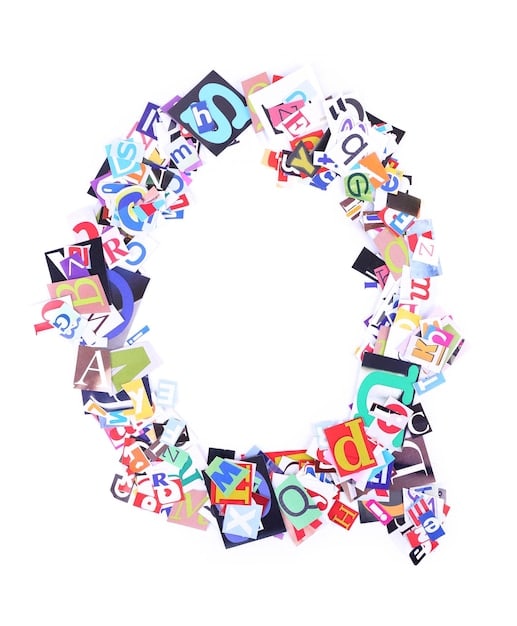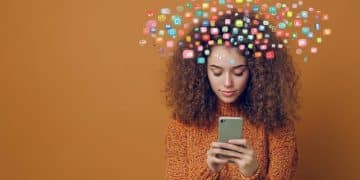Social Media & Mental Health: Finding a Healthy Balance in the US

Social media and mental health are intertwined; understanding this link is crucial for US users to find a healthy balance and mitigate potential negative impacts.
In today’s digital age, **social media and mental health: understanding the link and finding healthy balance** is more crucial than ever, especially for individuals in the US. We are constantly connected, scrolling through feeds, and comparing ourselves to others, which can have a significant impact on our well-being. Let’s explore this connection and how to navigate it mindfully.
The Double-Edged Sword: Social Media’s Impact
Social media has become an integral part of modern life in the US, offering numerous benefits but also presenting potential risks to mental health. It’s a double-edged sword, offering connection and community while simultaneously contributing to anxiety and feelings of inadequacy.
Benefits and Connections
Social media platforms provide opportunities to connect with friends and family, share experiences, and find communities with shared interests. This connectivity can be especially valuable for individuals who may feel isolated or marginalized.
The Downside: Comparison and Validation
However, the curated nature of social media often leads to comparisons with others, fostering feelings of inadequacy, envy, and low self-esteem. The constant pursuit of validation through likes and comments can also contribute to anxiety and a distorted sense of self-worth.

- Social Comparison: Constantly seeing idealized versions of others’ lives can lead to feelings of inadequacy and low self-esteem.
- Fear of Missing Out (FOMO): The perception that others are having more exciting or fulfilling experiences can trigger anxiety and a sense of missing out.
- Cyberbullying: Online harassment and bullying can have a devastating impact on mental health, leading to depression, anxiety, and even suicidal thoughts.
- Addiction and Distraction: Excessive social media use can become addictive, leading to decreased productivity, disrupted sleep patterns, and strained relationships.
Navigating the complexities of social media requires awareness and intentionality. Recognizing both the benefits and the potential pitfalls is the first step towards fostering a healthy relationship with these platforms.
Understanding the Psychology of Social Media Use
To truly grasp the impact of social media on mental health, it’s essential to delve into the psychological mechanisms at play. Several factors contribute to the addictive and often detrimental effects of these platforms.
The Dopamine Loop
Social media platforms are designed to trigger the release of dopamine, a neurotransmitter associated with pleasure and reward. Every like, comment, or notification provides a small hit of dopamine, reinforcing the behavior and creating a cycle of seeking validation.
The Illusion of Connection
While social media can facilitate connections, it often provides a superficial sense of connection that lacks the depth and intimacy of real-life relationships. This can lead to feelings of loneliness and isolation, despite being constantly connected online.
- Confirmation Bias: Social media algorithms often prioritize content that aligns with our existing beliefs, reinforcing biases and creating echo chambers.
- Availability Heuristic: The constant exposure to certain types of content can make us overestimate their prevalence in the real world, leading to distorted perceptions and anxieties.
- Cognitive Overload: The sheer volume of information and stimuli on social media can overwhelm our cognitive resources, leading to stress, fatigue, and difficulty concentrating.
By understanding these psychological mechanisms, individuals can become more aware of how social media is affecting their thoughts, emotions, and behaviors. This awareness is the first step towards making conscious choices about their online engagement.
Recognizing the Signs of Social Media-Related Mental Health Issues
Identifying the signs of social media-related mental health issues is crucial for seeking help and implementing strategies for a healthier relationship with these platforms. These signs can manifest in various ways, impacting both emotional and behavioral patterns.
Emotional Indicators
Emotional indicators might include increased anxiety, feelings of inadequacy, low self-esteem, persistent sadness, or difficulty experiencing joy. These feelings can be triggered by social comparison, cyberbullying, or the fear of missing out (FOMO).
Behavioral Changes
Behavioral changes can include spending excessive time on social media, neglecting real-life responsibilities, experiencing disrupted sleep patterns, or withdrawing from social activities. These changes can indicate an unhealthy dependence on social media for validation or escapism.

- Irritability and Restlessness: Feeling anxious or irritable when unable to access social media platforms.
- Decreased Productivity: Difficulty focusing on work or school tasks due to constant distractions from social media.
- Relationship Strain: Conflicts with family or friends due to excessive social media use or online behavior.
- Physical Symptoms: Experiencing headaches, eye strain, or neck pain due to prolonged screen time.
If you or someone you know is experiencing these signs, it’s important to seek professional help. A therapist or counselor can provide support and guidance in developing coping strategies and a healthier relationship with social media.
Strategies for a Healthier Relationship with Social Media
Cultivating a healthy relationship with social media requires conscious effort and the implementation of specific strategies. These strategies aim to minimize the negative impacts of these platforms while still enjoying their benefits.
Mindful Usage and Time Limits
Setting time limits for social media use is essential. Use built-in features or apps to track your time and receive notifications when you’ve reached your limit. Be mindful of when and why you’re using social media, and avoid mindless scrolling.
Curating Your Feed
Unfollow accounts that make you feel inadequate or trigger negative emotions. Focus on following accounts that inspire, uplift, and promote positive self-image. Remember, you have control over what you consume on social media.
- Practice Digital Detoxes: Take regular breaks from social media to reconnect with yourself and your surroundings.
- Engage in Real-Life Activities: Prioritize activities that bring you joy and fulfillment, such as spending time with loved ones, pursuing hobbies, or engaging in physical exercise.
- Practice Self-Compassion: Be kind to yourself and avoid comparing yourself to others. Remember that everyone’s journey is unique.
By implementing these strategies, individuals can create a more positive and balanced experience with social media, minimizing its negative impacts on their mental health.
The Role of Education and Awareness in Promoting Digital Well-being
Education and awareness play a critical role in promoting digital well-being and fostering a healthier relationship with social media, particularly among young people in the US. By equipping individuals with the knowledge and skills to navigate the online world mindfully, we can mitigate the potential risks and harness the benefits of these platforms.
Educational Programs in Schools and Communities
Schools and community organizations can implement programs that teach digital literacy, critical thinking skills, and healthy online habits. These programs can help young people understand the impact of social media on their mental health and develop strategies for responsible usage.
Parental Involvement and Guidance
Parents play a crucial role in guiding their children’s social media use. Open communication, setting boundaries, and modeling healthy online behavior are essential for promoting digital well-being within the family.
- Media Literacy Campaigns: Public service announcements and media campaigns can raise awareness about the potential risks of social media and promote healthy online habits.
- Mental Health Resources: Providing access to mental health resources and support services for individuals struggling with social media-related issues.
- Collaboration Between Stakeholders: Collaboration between schools, parents, mental health professionals, and social media platforms is essential for creating a comprehensive approach to promoting digital well-being.
By prioritizing education and awareness, we can empower individuals to make informed choices about their social media use and foster a healthier digital environment for all.
Seeking Professional Help and Support
If social media use is significantly impacting your mental health, seeking professional help and support is a crucial step towards recovery and well-being. Mental health professionals can provide guidance, therapy, and coping strategies to address the underlying issues and develop a healthier relationship with social media.
Therapy and Counseling
Therapy, such as cognitive-behavioral therapy (CBT), can help individuals identify and change negative thought patterns and behaviors related to social media use. Counseling can provide a safe space to explore emotions, build self-esteem, and develop coping skills.
Support Groups and Online Communities
Support groups and online communities can provide a sense of belonging and validation, allowing individuals to connect with others who understand their struggles. Sharing experiences and receiving support from peers can be incredibly beneficial.
- Mental Health Hotlines: Accessing mental health hotlines and crisis lines for immediate support during times of distress.
- Teletherapy: Utilizing teletherapy services for convenient and accessible mental health care.
- Self-Help Resources: Exploring self-help resources such as books, articles, and apps that provide strategies for managing social media use and improving mental well-being.
Remember, seeking help is a sign of strength, and there are many resources available to support individuals in their journey towards a healthier relationship with social media.
| Key Point | Brief Description |
|---|---|
| 📱 Social Comparison | Constant exposure to idealized lives on social media can lead to feelings of inadequacy. |
| ⏰ Time Management | Setting limits on social media use can help reduce feelings of addiction and improve mental well-being. |
| 🌱 Mindful Engagement | Being conscious of your online interactions and the content you consume can foster a healthier relationship with social media. |
| 🤝 Seeking Support | If social media negatively impacts your mental health, seeking professional support or joining a community can provide needed assistance. |
FAQ
▼
Social media can lead to social comparison, feelings of inadequacy, and fear of missing out. Cyberbullying and addiction are also potential risks, impacting self-esteem and overall well-being.
▼
Signs include spending excessive time online, neglecting responsibilities, feeling anxious without access, and prioritizing online interactions over real-life relationships.
▼
Set time limits, curate your feed to unfollow triggering content, engage in real-life activities, and practice self-compassion to avoid constant comparison.
▼
It’s important if you’re feeling too stressed, overwhelmed or experiencing changes in your mood you seek professional help from a therapist or join a support group.
▼
Education equips individuals with knowledge and critical thinking skills to navigate social media responsibly, mitigate risks, and promote healthier online habits from a young age.
Conclusion
Navigating the complexities of social media requires awareness, intentionality, and a commitment to prioritizing mental well-being. By understanding the link between social media and mental health, implementing healthy strategies, and seeking support when needed, individuals in the US can cultivate a balanced and fulfilling relationship with these powerful platforms.





